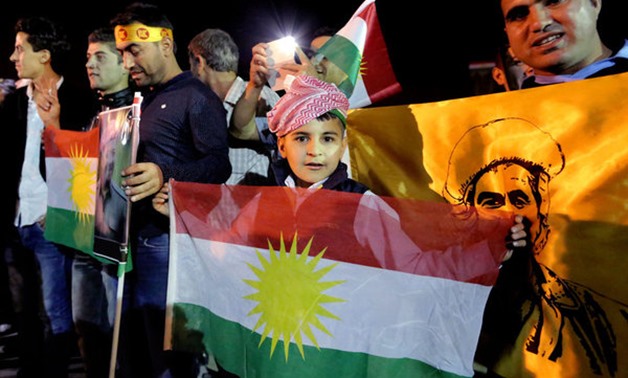
Supporters of Kurdish peshmerga forces hold Kurdish flags as they wait for the troops to cross the Iraqi - AFP
ERBIL/LONDON, Iraq Sept 22 2017: About five million people in Kurdish-held areas of northern Iraq will be summoned to take part in a non-binding referendum on independence from Iraq on Monday.
They will be asked to tick a yes/no box next to this question: "Do you want the Kurdistan region and the Kurdish areas outside the region's administration to become an independent state?"
HISTORY:
The Kurds are the largest ethnic group left stateless when Britain and France, the colonial powers which won World War One, carved up the Ottoman empire. The region's roughly 30 million ethnic Kurds were left scattered, mainly over four countries: Iraq, Iran, Turkey and Syria. All of them suffered persecution and were often denied the right to speak their language. Those in Iraq were uprooted under Saddam Hussein's regime and suffered an attack using chemical weapons.
WHY THE REFERENDUM?
The autonomous Kurdistan Regional Government (KRG) in northern Iraq says the Shi'ite ruled central government in Baghdad has failed to respect autonomy established after the 2003 overthrow of Saddam Hussein in a U.S.-led invasion.
WHY NOW?
The KRG says the vote acknowledges the Kurds' crucial contribution confronting Islamic State after it overwhelmed the the Iraqi army in 2014 amd seized control of a third of Iraq.
WHAT'S THE LIKELY OUTCOME AND WHAT'S THE NEXT MOVE:
The outcome is likely to be a comfortable "yes". The KRG, led by Massoud Barzani, plans to use the vote as a legitimate mandate to press for negotiations with Baghdad and neighboring countries to achieve independence.
WHY IS THE CENTRAL GOVERNMENT OPPOSED TO THE VOTE? Baghdad thinks the vote could lead to a messy breakup of Iraq at a time when it is struggling with reconstruction and the return of refugees. It offers talks to resolve disputes over land, energy and power sharing, including the status of the multi-ethnic oil region of Kirkuk.
WHY ARE TURKEY AND IRAN OPPOSED TO THE REFERENDUM?
Iraq's powerful neighbours fear separatist contagion for their own Kurdish populations. Turkey is home to the largest Kurdish minority. It has been fighting Kurdish insurrection in its south-east since 1984. Iran's Kurds are close culturally to Iraq's Kurds and they speak the same Kurdish language. Tehran is also close to the Shi'ite political parties who have been ruling Iraq or holding key security or government positions since 2003.
Syria is embroiled in a civil war in which its own Kurds are pressing for self-administration.
WHO ELSE OPPOSES IT?
About everyone, including the United States and United Nations who fear a destabilization of Iraq while the war with Islamic State is not yet over.
WHY OIL-RICH KIRKUK IS EMERGING AS A FLASHPOINT:
Kirkuk is a multi-ethnic city. It lies outside the recognised Kurdish region and is home to Kurds, Turkmen, Arabs and Assyrian Christians. It sits on susbtantial oil reserves and its crude is exported through a pipeline to the Mediterranean that crosses KRG territory and Turkey. If Turkey decides to close the pipeline, it would deprive the KRG government in Erbil of most its hard currency income.
THE KURDISH REGION'S IMPORTANCE TO OIL MARKETS:
Iraqi Kurdistan produces around 650,000 bpd of crude from its fields, including around 150,000 bpd from the disputed areas of Kirkuk. The region's production volumes represent 15 percent of total Iraqi output and around 0.7 percent of global oil production. The KRG aspires to raise production to over 1 million bpd by the end of this decade.
THE KURDISH REGION'S IMPORTANCE TO OIL COMPANIES:
Kurdish oil production has been dominated by mid-sized oil firms such as Genel, DNO, Gulf Keystone and Dana Gas. Major oil firms such as Chevron , Exxon Mobil and Rosneft also have projects in Kurdistan but they are mostly at an exploration stage. Russia's state oil major Rosneft, however, has lent over $1 billion to the KRG guaranteed by oil sales and committed a total of $4 billion to various projects in Kurdistan. Trading houses Vitol, Glencore, Trafigura and Petraco have lent a total of $2 billion to Kurdistan guaranteed by oil sales while Turkey has also provided a total of $1.5 billion to support Erbil in the past two years.
WHO CAN VOTE AND WHERE?
All registered residents of the Kurdish-held region in northern Iraq, Kurds and non-Kurds, are eligible to vote. The Kurdish-held regions include those inside the official boundaries of the KRG and surrounding areas that Peshmerga fighters seized in the course of the war on Islamic State. Kirkuk lies outside the KRG and is also claimed by Baghdad.
Internally displaced people from the disputed territories will be allowed to vote. Iraq's Kurdish diaspora will also be allowed to submit electronic ballots on Sept. 23 and 24.


Comments
Leave a Comment